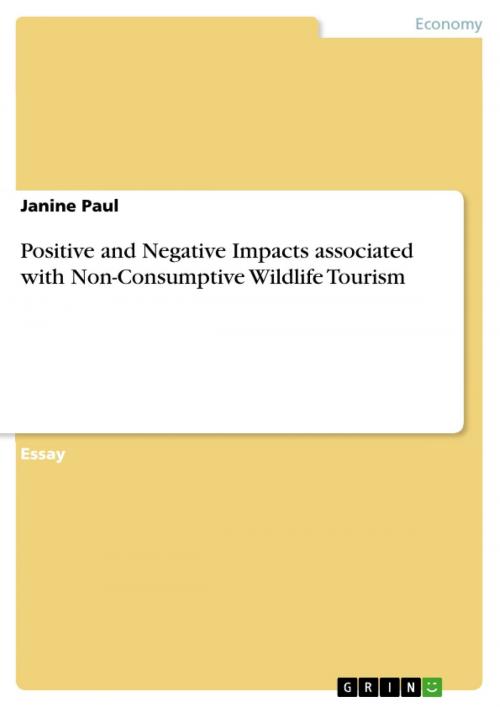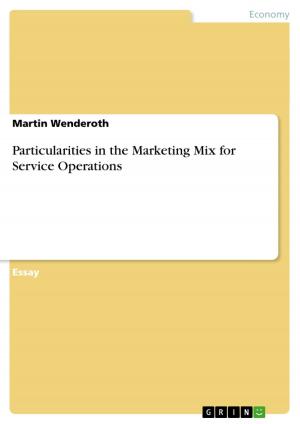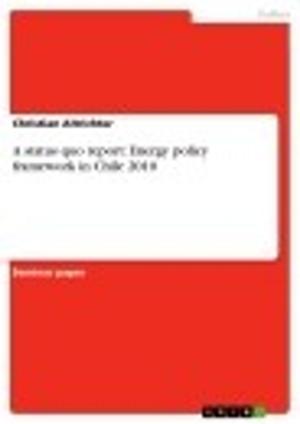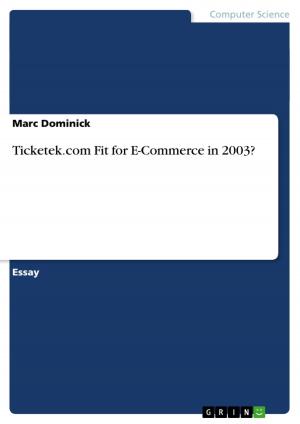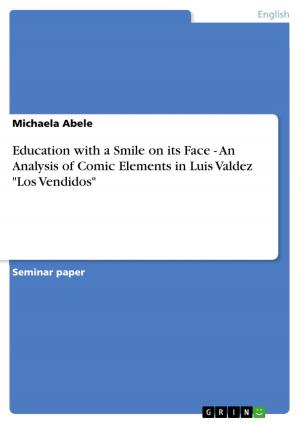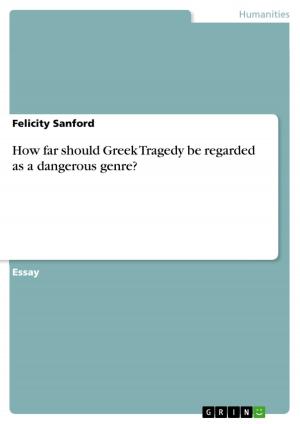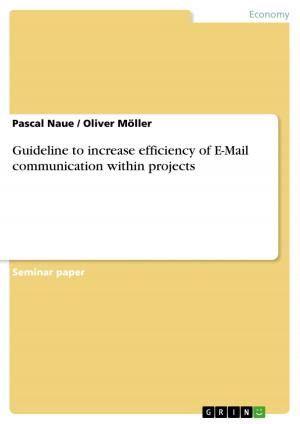Positive and Negative Impacts associated with Non-Consumptive Wildlife Tourism
Business & Finance, Industries & Professions, Hospitality, Tourism & Travel| Author: | Janine Paul | ISBN: | 9783638060998 |
| Publisher: | GRIN Publishing | Publication: | June 11, 2008 |
| Imprint: | GRIN Publishing | Language: | English |
| Author: | Janine Paul |
| ISBN: | 9783638060998 |
| Publisher: | GRIN Publishing |
| Publication: | June 11, 2008 |
| Imprint: | GRIN Publishing |
| Language: | English |
Essay from the year 2007 in the subject Tourism, grade: 2,3, Bournemouth University, course: Tourists and Destinations, 43 entries in the bibliography, language: English, abstract: The aim of wildlife tourism 'is to visit a destination in order to see and gain an understanding of the local fauna without harming the natural environment' (Mintel, 2006). Duffus & Dearden (1990) developed three dimensions of wildlife - human interaction which are illustrated in Figure 1. This study focuses on non-consumptive wildlife tourism. This form of niche tourism includes observing and interacting with animals without harming them with a special interest in wildlife conservation (Higginbottom 2004, Duffus & Dearden, 1990). The future for wildlife tourism is predicted to grow rapidly within the next 10 years. A shift away from the single adventurers to a more general target group is forecasted (Mintel, 2006) leading eventually to mass tourism and more negative impacts. The question is where the desire, to be close to nature, comes from. One view is, that 'humans evolved in the natural environment, changing in response to it' (Knopf, 1987). Animals have provided much of the food supply for most societies (Orams, 2002). Furthermore, the every day life of the human being demands directed attention and full power. There is the desire to be 'free', unconventional and enjoy life (Newsome, 2005). Furthermore, Kim & Jamal (2007) introduce that the today's society is inauthentic and isolated, driving people to travel in search for an authentic experience. This could take the form of staged authenticity - making a product out of it (Goffman, 1963 cited in Kim & Jamal, 2007). The desire to experience nature is stimulated through the media (Orams, 2002). In addition a growing concern for the environment, visible e.g. through the Kyoto protocol, enhances this phenomenon (Mapleweb, 2005). Fredrickson & Anderson (1999: 30) found that a close relationship to animals leads to a decrease in depression and stress enhancing social interaction as the natural experience enables the tourist a 'step away from the stresses of life.'
Essay from the year 2007 in the subject Tourism, grade: 2,3, Bournemouth University, course: Tourists and Destinations, 43 entries in the bibliography, language: English, abstract: The aim of wildlife tourism 'is to visit a destination in order to see and gain an understanding of the local fauna without harming the natural environment' (Mintel, 2006). Duffus & Dearden (1990) developed three dimensions of wildlife - human interaction which are illustrated in Figure 1. This study focuses on non-consumptive wildlife tourism. This form of niche tourism includes observing and interacting with animals without harming them with a special interest in wildlife conservation (Higginbottom 2004, Duffus & Dearden, 1990). The future for wildlife tourism is predicted to grow rapidly within the next 10 years. A shift away from the single adventurers to a more general target group is forecasted (Mintel, 2006) leading eventually to mass tourism and more negative impacts. The question is where the desire, to be close to nature, comes from. One view is, that 'humans evolved in the natural environment, changing in response to it' (Knopf, 1987). Animals have provided much of the food supply for most societies (Orams, 2002). Furthermore, the every day life of the human being demands directed attention and full power. There is the desire to be 'free', unconventional and enjoy life (Newsome, 2005). Furthermore, Kim & Jamal (2007) introduce that the today's society is inauthentic and isolated, driving people to travel in search for an authentic experience. This could take the form of staged authenticity - making a product out of it (Goffman, 1963 cited in Kim & Jamal, 2007). The desire to experience nature is stimulated through the media (Orams, 2002). In addition a growing concern for the environment, visible e.g. through the Kyoto protocol, enhances this phenomenon (Mapleweb, 2005). Fredrickson & Anderson (1999: 30) found that a close relationship to animals leads to a decrease in depression and stress enhancing social interaction as the natural experience enables the tourist a 'step away from the stresses of life.'
